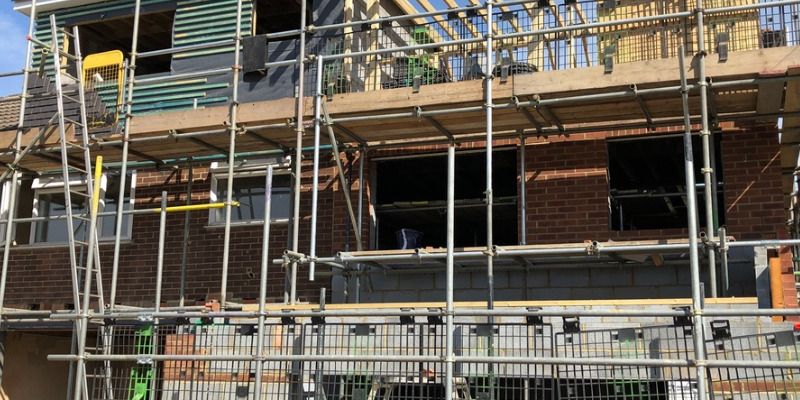Frequently Asked Questions
We answer some frequently asked questions relative to Self-Build insurance that we get asked about regularly. If you have a question that’s not answered here, please call us on 0333 456 8030 as we would love to hear from you.
Is Site Insurance or a 10 Year structural warranty a legal requirement?
There is no law sating you must have these products, unless you are employing direct labour. In this case you will need employers’ liability, which is included in our site insurance products. That said, your lender will normally insist on them for the simple reason that if you have a major accident on site it can be a huge financial burden, which without insurance may be difficult to recover from.
I’m not doing any of the work myself as I’m contracting a builder to do it – what self-build insurance do I need?
Have a look at our Essential Guide which outlines the coverage you need to consider and what to do if you are relying on your builders insurance.
How does a specific self build structural warranty differ and what makes a self build structural warranty unique?
Self builders need to avoid structural warranties with a defect period. A high percentage of structural warranty claims occur in the first two years. Clearly as you’re directly commissioning the build, a standard new home warranty would make you responsible for issues in that timeframe. If you’re building your own dream home, you’re almost certainly putting your life savings into the project. So, you’re highly unlikely to have the financial resources in place to rebuild a property which has been the subject of a major defect. Nor are you going to want to be bound by the significant onerous legal instruments outlined above. This is where the uniqueness of a self build warranty comes in to its own. The policy is designed to give you as builder and first homeowner insurance cover from the date of practical completion. Importantly, it does not have a defects period. So it provides cover from day one, de-risking the financial implications of a major defect.
Why should I choose Protek over another provider?
Protek has been serving the self-build, renovation, conversion and extension sector for many years. This means we really understand the sector. The products we offer, combined with the expertise of our staff and the security rating of our carrier, mean you really are in good hands. We have designed products that are flexible, comprehensive and competitive – backed by excellent service levels.
Which lenders accept the Protek Warranty?
Click this link for more information on which lenders accept the warranty.
What is a CML, Architects or Professional Consultants Certificate ?
Professional Consultant Certificates are often advertised as low cost alternatives to a structural warranty. But they are cheaper alternative for a reason:
A professional consultants certificate is not an insurance policy. It is just a certificate identifying who the professional was. If a defect manifests itself, you will have to prove the professional was negligent and that can be a costly and fruitless exercise. The certificate is issued on the back of professional indemnity insurance. If the professional fails to renew this or goes out of business – you are unlikely to have any protection whatsoever.
A recent court case highlights some of the dangers https://www.thenbs.com/knowledge/court-of-appeal-provides-clarity-on-architects-certificates
What’s the difference between a Self Build and New Home Warranty?
The difference between a self-build and new home warranty is that a self-build warranty does not have the limitation of a 2 year defect period. A defect period makes the ‘builder’ responsible for defects occurring during the first two years. Clearly if you’re the self builder then you are unlikely to have the resources to rebuild it as the ‘builder’ if there is a major defect in the first two years. This is why a self-build structural warranty policy starts from the date of completion and does not have a defects period. It gives you as the policyholder cover from day one.
This differs massively from a ‘New Home Warranty’ which is designed to be purchased by the builder who is developing homes to sell to a prospective purchaser. A New Home Warranty carries an initial 2 year defect period where the builder is responsible for anything that goes wrong during that initial period. Read More
I’m doing all the work myself and it could take a couple of years will you cover me?
Yes – that’s real self-building and believe it or not you are actually in the minority, as most people use a builder and subcontractors. We have insurance and warranty solutions for you.
What’s the difference between Site Insurance and a Structural Warranty?
A site insurance policy can cover the works in progress, plant, tools equipment, materials, liability etc., during the build. If you fall victim to a fire, flood or your materials are stolen, then you can be adequately covered. A structural warranty starts when the project is complete and provides 10 years’ cover against defects in the design, workmanship, materials and components of the structure causing major damage or defective weatherproofing.
When should I take out site insurance?
Site insurance should be in place from the moment you exchange contracts on the plot or property you are about to start work on.
I haven’t got any Site insurance, but I’m already a way through the project!
Don’t worry you are not alone. Fortunately we can provide you with site insurance and a structural warranty even if you have started, but its worth bearing in mind that a structural warranty becomes more expensive the longer you leave it.
Professional Reinstatement Cost. What does it mean?
It’s the cost of rebuilding the project using professional contractors. Should your project be destroyed by fire two days before you are due to move, it will need to be rebuilt as quickly as possible using professional contractors. This will be higher than your self-build ‘build cost’. Always insure for the professional reinstatement cost. Click here to check out our article written for Build-It magazine on the subject?
What about existing structures – how should I insure them?
It is very important you insure existing structures. This is especially true if your project includes an existing retained element like in a conversion, renovation or extension project. Site insurance can include cover for the existing retained element. This is useful if you are converting a barn or carrying out a renovation. It can also include retained materials (roof tiles for example). This is useful if you are planning on reusing them in the project at a later date.
It is important to understand that most household policies will not cover the existing structure (house) sufficiently whilst works are being carried out.
How do I go about making a claim?
Call us on 0333 456 8030 or email claims@protekselfbuild.co.uk. If you have experienced a theft, it is important you report it to the police as we will need the crime reference number. It is important that you read and understand the claims procedures contained in your policy wording. If you are unsure as to whether you need to make a claim, please call Protek for further assistance.
Who underwrites the policy?
Site insurance is underwritten by QBE Insurance (Europe) Limited,
Self Build Structural warranty is underwritten by QBE Insurance (Europe) Limited
What is a technical audit?
The technical audit is an essential part of providing a structural warranty. The technical audit comprises a design check and a series of site based inspections. These are all reported after a series of inspections, to ensure its designed and built in accordance with technical standards.
Can you incorporate building control into the technical audit process?
Yes we can, in fact it’s financially and operationally more effective to have one entity providing the building control and technical audit on the project. This is an option you can select during the quotation process.
I’m using my local authority to do the building control – Is that OK?
Yes, it is absolutely fine. Click here to get a quote now.
What happens if I’m building to sell?
We have a range of solutions to assist you if you are building one or more units to sell on. This is because not every project is the same. Just get in contact with us and we will happily talk you through the options available.
Can I rely on home insurance if I am extending or renovating?
Most people extending or altering a property simply don’t realise that their average home insurance policy is unlikely to provide sufficient cover, especially if there is an element of self-build or self-management. The assumption is that their contractor will be covering the works, but invariably that just isn’t the case. more
We will continue to add frequently asked questions to this page.






